

The (De)Motivating Effects of Relative Performance Evaluation. We compare ourselves to others every day.
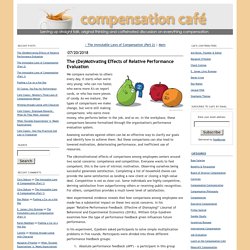
It starts when we're very young: who can run faster, who earns more A's on report cards, or who has more pieces of candy. As we mature, the types of comparisons we make change, but we're still making comparisons: who earns more money, who performs better in the job, and so on. In the workplace, these comparisons become formalized through the organization's performance evaluation system. Assessing ourselves against others can be an effective way to clarify our goals and identify how to achieve them.
But these comparisons can also lead to lowered motivation, deteriorating performance, and inefficient use of resources. The (de)motivational effects of comparisons among employees centers around two social concerns: competence and competition. New experimental evidence reveals that how comparisons among employees are made has a substantial impact on these two social concerns. Address the Core Issues with Performance Reviews. Choisir les objectifs. Executifs et autres managers, si vous ne faites pas participer activement l'ensemble des équipes à la sélection des objectifs de performance, ne soyez pas surpris si la motivation et l'enthousiasme flirtent avec le zéro Kelvin absolu.

La réussite du projet management de la performance, pilotage et tableaux de bord repose sur cette phase fondamentale de sélection "coopérative" des objectifs de performance. Les objectifs sont traditionnellement fixés en tenant uniquement compte des performances passées. Êtes-vous pour la performance ou pour le résultat ? La transformation actuelle de notre société s’apparente à une redéfinition radicale des standards de productivité, autrement dit une nouvelle approche de la performance.
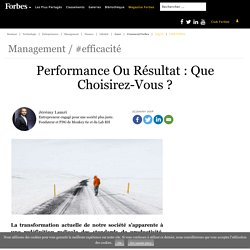
Mais parle-t-on de performance ou de résultat ? Ces deux termes sont en fait deux notions aux philosophies très éloignées, et empreintes de représentations sociales très fortes. Address the Core Issues with Performance Reviews. Détection des hauts potentiels: Ne cassez pas vos talents! Un haut potentiel est différent d’un expert.
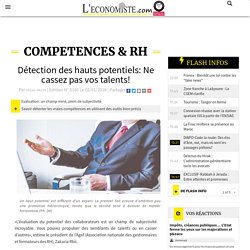
Le premier fait preuve d’ambition pour une promotion hiérarchique, tandis que le second tend à évoluer de manière horizontale (Ph. DR) I Don't Trust You. An often heard complaint about an organization's performance appraisal program is that the employees don't trust their manager to conduct a fair assessment of performance.
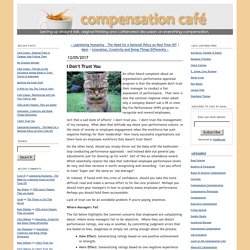
That view is also the common response when asked why a company doesn't use a PA or even Pay-For-Performance (P4P) program to recognize and reward employees. Isn't that a sad state of affairs? I don't trust you. 6 Steps to Great Talent Reviews. It’s great news that talent reviews have become almost universal in larger organizations, avoiding the fads that have overtaken HR processes like performance management.
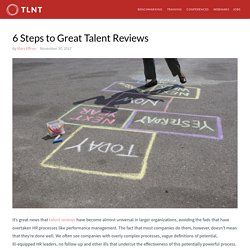
The fact that most companies do them, however, doesn’t mean that they’re done well. We often see companies with overly complex processes, vague definitions of potential, ill-equipped HR leaders, no follow-up and other ills that undercut the effectiveness of this potentially powerful process. Our experience conducting hundreds of talent reviews and building the process for complex global companies shows us that six factors create a successful talent review: 1.
How Office Politics Corrupt the Search for High-Potential Employees. Executive Summary Few topics have captivated talent management discussions more intensely than potential.

But how good are we at evaluating high-potential employees (HiPos)? The answer is, it’s mixed. What Science Says About Identifying High-Potential Employees. Apply Design Thinking to Performance Management. 6 Reasons Not to Use SMART Goals For Everything. You’re probably familiar with the concept of SMART goals.
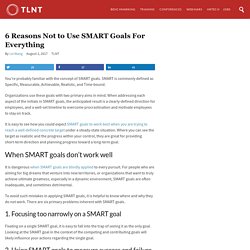
SMART is commonly defined as Specific, Measurable, Achievable, Realistic, and Time-bound. Organizations use these goals with two primary aims in mind. When addressing each aspect of the initials in SMART goals, the anticipated result is a clearly-defined direction for employees, and a well-set timeline to overcome procrastination and motivate employees to stay on track.
5 Key Components of Any Successful Performance Management Process. The Case For Junking 9 Box Assessments. The “9 box” is one of the most popular assessment methods in talent management.
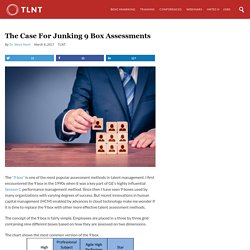
I first encountered the 9 box in the 1990s when it was a key part of GE’s highly influential Session C performance management method. Since then I have seen 9 boxes used by many organizations with varying degrees of success. But recent innovations in human capital management (HCM) enabled by advances in cloud technology make me wonder if it is time to replace the 9 box with other more effective talent assessment methods.
The concept of the 9 box is fairly simple. Employees are placed in a three by three grid containing nine different boxes based on how they are assessed on two dimensions. The chart shows the most common version of the 9 box. Feedback From A to Z. It’s no secret that feedback is a hugely important in the workplace.
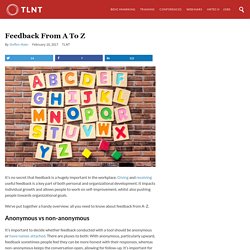
Giving and receiving useful feedback is a key part of both personal and organizational development. It impacts individual growth and allows people to work on self-improvement, whilst also pushing people towards organizational goals. We’ve put together a handy overview: all you need to know about feedback from A-Z. Anonymous vs non-anonymous It’s important to decide whether feedback conducted with a tool should be anonymous or have names attached. Biases. Les entretiens annuels et les biais inconscients - Revolution-RH. La conduite des entretiens annuels fait partie des rituels RH que tout manager connaît. Pourtant il ne connaît pas tout, puisqu’une dimension est souvent complètement laissée dans l’ombre : les biais inconscients, qui mènent à des entretiens subjectifs. 4 Reasons to Replace Performance Reviews. Performance Management Might Change But It's Not Going Away.
If there was one term that dominated the workplace conversation in 2016 it was the “performance appraisal.” That’s okay. I think it’s good to re-evaluate traditions. Entretien individuel: le manager idéal. Dans toutes les organisations, le rôle du manager est avant tout de tirer son équipe vers le haut. Dans cette optique, l’entretien annuel constitue un rendez-vous crucial, au service de la performance collective. Stéphane SEIRACQ est consultant, coach et médiateur professionnel. Il assure le développement des PME, PMI et grandes entreprises, à travers le management des hommes, et du conseil en Ressources Humaines. L'entretien annuel : une pratique à revisiter ? Comme souvent, c'est un article de la prestigieuse "Harvard Business Review"[1] qui a jeté un pavé dans la mare en osant poser la question de l'utilité d'une des pratiques RH parmi les plus pérennes mais aussi les plus pratiquées : l'entretien annuel d'évaluation.
L'agilité, mot à la mode, que l'on demande de plus en plus aux entreprises serait, selon les auteurs de cet article, incompatible avec le maintien d'une pratique aussi rigide voire ringarde représentée par l'entretien annuel. A l'heure de la révolution digitale marquée par l'accélération du temps, cette rencontre rituelle annuelle entre le manager et son collaborateur apparaîtrait comme totalement obsolète. Google got it wrong. The open-office trend is destroying the workplace. Facebook, like many tech companies, uses the open-space office model. (Ryan Anson/AFP/Getty Images) A year ago, my boss announced that our large New York ad agency would be moving to an open office.
After nine years as a senior writer, I was forced to trade in my private office for a seat at a long, shared table. It felt like my boss had ripped off my clothes and left me standing in my skivvies. Our new, modern Tribeca office was beautifully airy, and yet remarkably oppressive. Entretien annuel d'évaluation : un rite incongru, stérile et contre-productif ? - Solutions Fortes. L’entretien annuel d’évaluation est un rite obsolète. Quoi qu’on y mette et quel que soit le nom dont on l’affuble il se révèle être, à l’usage, aussi impertinent que roboratif. A l’envers de sa destination, il couvre l’incurie du management au quotidien et sert de caution au mauvais management. Lorsque le manager est excellent, ça ne doit être qu’une formalité conviviale.
Personnalité et performance au travail - article RH- Central Test. Si l'évaluation de la personnalité est devenue pratique courante dans de nombreuses entreprises, rares sont celles qui établissent un lien direct entre la personnalité et la performance au travail. Au même titre que les motivations, l'intelligence ou l'expérience, la personnalité est un indicateur de réussite si elle est en concordance avec le poste envisagé. Mais à quel point la personnalité influence-t-elle la performance ? La personnalité n'explique pas à elle seule la performance, « mais sur certains traits spécifiques, un lien existe, appuie Patrick Leguide, fondateur de Central Test.
L’évaluation à 360° n’est pas anxiogène en soit , quoique … ou les dérives anxiogènes de l’évaluation à 360° Contrairement à ce que prétendent certains sociologues, journalistes, médecins du travail et syndicalistes, une évaluation 360° n’est pas anxiogène en soit : c’est la façon de la concevoir, la finalité qu’elle poursuit, ses modalités d’application et surtout le contexte dans lequel ce type d’évaluation est mis en place qui sont susceptibles d’être anxiogènes.
Rappel historique : la pratique de l’évaluation à 360° nait aux USA il y a 20 ans environ. Elle repose sur le principe de la confrontation entre ce qu’un professionnel (manager, commercial ou autres) pense faire et ce que les autres (son entourage, n+1, n-1, co-latéraux, clients) le voient faire. Comment les clauses de non-concurrence brident la performance.
Harvard Business Review Août-Septembre 2014 Mag Carrière Comment les clauses de non-concurrence brident la performance Mag. Performance Management : le talon d’Achille de la RH ? – Human Capitaliser. Ecrit par Hedi Ateb – 10 minutes read Le modèle est remis en question. Forbes Welcome.